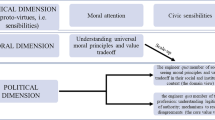Abstract
This paper briefly summarizes current thinking in engineering ethics education, argues that much of that ethical instruction runs the risk of being only superficially effective, and explores some of the underlying systemic barriers within academia that contribute to this result. This is not to criticize or discourage efforts to improve ethics instruction. Rather it is to point to some more fundamental problems that still must be addressed in order to realize the full potential of enhanced ethics instruction. Issues discussed will include: intellectual engagement versus emotional engagement; the gravitational pull of curricular structures; the nature of engineering faculty; and the “engineer-ization” of ethics.
Similar content being viewed by others
References
Stephan, Karl D. (1999) A Survey of Ethics-Related Instruction in U. S. Engineering Programs. Journal of Engineering Education 88(4): 459–464.
Herkert, Joseph R. (2001/2002) Engineering Ethics: Continuing and Emerging Issues. IEEE Technology and Society Magazine 20(4): 4–5.
Kline, Ronald R. (2001/2002) Using History and Sociology to Teach Engineering Ethics. IEEE Technology and Society Magazine 20(4): 13–20.
Gorman, Michael. (2001/2002) Turning Students into Ethical Professionals. IEEE Technology and Society Magazine 20(4): 21–27.
Pfatteicher, Sarah K. A. (2001) Teaching vs. Preaching: EC2000 and the Engineering Education Dilemma. Journal of Engineering Education 90(1): 137–142.
Haws, David R. (2001) Ethics Instruction in Engineering Education: A (Mini) Meta-Analysis. Journal of Engineering Education 90(2): 223–229.
Splitt, Frank G. (2003) Systemic Engineering Education Reform: A Grand Challenge. The Bent of Tau Beta Pi Spring 2003: 29–34.
Williams, Rosalind. (2003) Education for the Profession Formerly Known as Engineering. The Chronicle of Higher Education 49(20): B12-B13.
Stephan, Karl D. (2001/2002) Is Engineering Ethics Optional? IEEE Technology and Society Magazine 20(4): 6–12.
Harris, Charles E. Jr.; Davis, Michael; Pritchard, Michael S.; & Rabins, Michael J. (1996) Engineering Ethics: What? Why? How? And When? Journal of Engineering Education 85(2): 93–96.
Lynch, William T. (1997/1998) Teaching Engineering Ethics in the United States. IEEE Technology and Society Magazine 16(4): 27–36.
Davis, Michael (1998) Thinking Like an Engineer: Studies in the Ethics of a Profession. Oxford University Press, New York.
Unger, Steven H. (1994) Controlling Technology: Ethics and the Responsible Engineer. John Wiley & Sons, New York.
Herkert, Joseph R. (2000) Engineering Ethics Education in the USA: Content, Pedagogy and Curriculum. European Journal of Engineering Education 25(4): 303–313.
Self, Donnie J. and Ellison, Elizabeth M (1998) Teaching Engineering Ethics: Assessment of Its Influence on Moral Reasoning Skills. Journal of Engineering Education 87(1): 29–34.
Broome, Taft. H. Jr. (1999) The Concrete Sumo. Online Ethics Center for Engineering and Science, http://onlineethics.org/essays/education/broome.html.
Makkai, Toni (1991) The Formation and Evolution of Professional Engineering Values. The Australian and New Zealand Journal of Sociology 27(3): 332–350.
Russell, Jeffrey S.; Stouffer, Brewer; and Walesh, Stuart G. (2000) The First Professional Degree: A Historic Opportunity. Journal of Professional Issues in Engineering Education and Practice 126(2): 54–63.
Academic Prerequisites for Licensure and Professional Practice. (2001). ASCE: http://www.asce.org/pressroom/news/policy_details.cfm?hdlid=15.
Baker, Merl (1996) Reengineering PhD Programs. 1996 ASEE Annual Conference Proceedings. ASEE, Washington D.C.
Vanderburg, Willem H. and Khan, Namir (1994) How Well is Engineering Education Incorporating Societal Issues? Journal of Engineering Education 83(4): 357–361.
Civil Engineering Body Of Knowledge For The 21st Century: Preparing The Civil Engineer For The Future — Executive Summary (2003 — draft). ASCE: http://www.asce.org/files/pdf/execsummary.pdf.
Author information
Authors and Affiliations
Corresponding author
Rights and permissions
About this article
Cite this article
Newberry, B. The dilemma of ethics in engineering education. SCI ENG ETHICS 10, 343–351 (2004). https://doi.org/10.1007/s11948-004-0030-8
Issue Date:
DOI: https://doi.org/10.1007/s11948-004-0030-8




